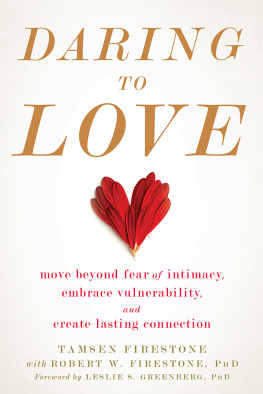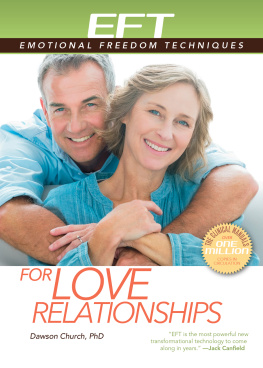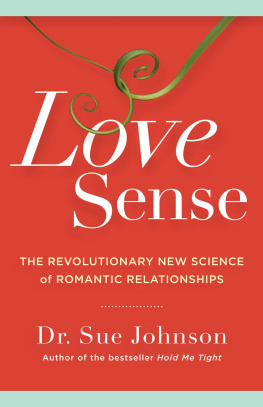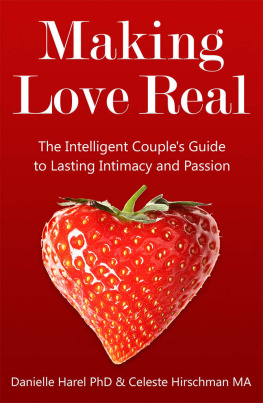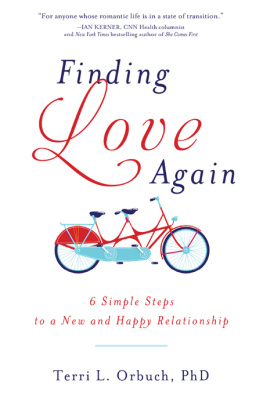
Robert Firestone, clearly one of the most influential therapists of our generation, and Tamsen Firestone, have teamed up to write Daring to Love. This book is the definitive guide for integrating voice therapy into relationships. Since the text is packed from cover to cover with valuable journal exercises, it is a wonderful reference for therapists as well as clients who can use it for bibliotherapy. The key insight is that most individuals need to stop pushing away love, and this book provides a wealth of useful interventions.
Howard Rosenthal, EdD, author of Encyclopedia of Counseling and Encyclopedia of Human Services
Daring to Love is a wonderfully wise, beautifully written, and eminently practical book for anyone wishing to establish and maintain deeper, richer, and more lasting close relationships. It distills decades of research and clinical experience aimed at understanding and overcoming personal and relational barriers to happy, psychologically healthy living. The book contains many useful, personally engaging exercises based on the authors voice therapy, organized around specific barriers to intimacy. As a relationship researcher who frequently writes about attachment theory and close relationships, I receive numerous requests for books that help a person overcome relationship problems. Daring to Love will now be on my short list of enthusiastic recommendations.
Phillip R. Shaver, PhD, distinguished professor of psychology emeritus, University of California, Davis; coeditor of Handbook of Attachment; and coauthor of Adulthood
This book invites us into raw vulnerability only made possible by the competent, compassionate hands of two authors who have livedand lovedthe principles they set forth. Perhaps the last paragraph of this book explains why it deserves to be read, integrated, and actualized into practice: Love is worth believing in. Love is worth fighting for. Love is worth the personal challenge. No other endeavor offers higher rewards.
Pat Love, EdD, LMFT, author of The Truth About Love
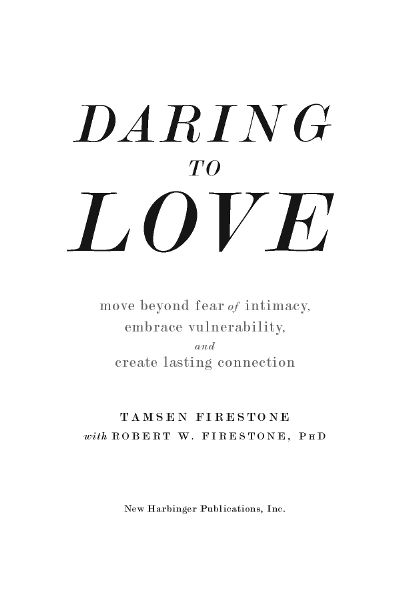
Publishers Note
This publication is designed to provide accurate and authoritative information in regard to the subject matter covered. It is sold with the understanding that the publisher is not engaged in rendering psychological, financial, legal, or other professional services. If expert assistance or counseling is needed, the services of a competent professional should be sought.
Distributed in Canada by Raincoast Books
Copyright 2018 by Tamsen Firestone and Robert W. Firestone
New Harbinger Publications, Inc.
5674 Shattuck Avenue
Oakland, CA 94609
www.newharbinger.com
Cover design by Amy Shoup
Edited by Xavier Callahan
All Rights Reserved
Library of Congress Cataloging-in-Publication Data on file
Being deeply loved by someone gives you strength, while loving someone deeply gives you courage.Lao TzuThis book is dedicated to each of you who, with strength and courage, is daring to love.
Contents
Immature love says: I love you because I need you. Mature love says: I need you because I love you.
Erich Fromm, The Art of Loving
Emotions are fundamentally relationalthey link us to each otherso any relationship is a wellspring of emotional experience. But in order to be intimate with a partner in a love relationship, we have a special need to manage our emotions wisely.
Once we are aware of what we feel, our emotions give us information about whether an intimate bond is in good condition or in need of maintenance. We are calm and feel good when all is going well between us, and we are disturbed and upset when all is not well.
As human beings, we have been primed by evolution to have pleasant feelings when we are close to others and when we are recognized and valued by others, and this was especially so with respect to our caregivers during childhood. Today, as adults seeking to form healthy attachments and intimate relationships, we find that we continue to depend on emotional availability along with responsiveness, security, and warmth. We need others in order to feel secure and happy.
We feel secure in our love relationships when we have the closeness we need. Another important element is attraction, liking, and romantic passion. Warmth, liking, and appreciation of the other comprise a distinct aspect of the bonding system. We all seek and desire our partners for our excitement, interest, and joy in who they are.
But when we dont deal with our emotions and express our needs, negative patterns of interaction develop. The primary vulnerable emotions that underlie the threats to healthy attachment are fear of being unable to survive on our own and sadness at the possible loss of the comfort provided by our loved one. Another primary vulnerable feeling that can arise in a love relationship comes from threats to our identity and self-esteem. We feel worthy (that is, we feel pride) when we are recognized and validated by our partner, and we experience unpleasant feelings of shame or powerlessness when we are ignored or controlled. In this way, feelings of shame from threats to our identity and self-esteem can become central to how we feel about our partner.
Thus, conflict between partners emerges from continuing but unmet needs in adulthood for attachment, identity (or self-esteem), and affection. At the same time, the problem between the partners is not the particular needs that one or both of them may have. The problem is either fear of expressing those needs or the way in which the frustration of those needs is being managed. The solution is not for one partner to try to get his or her needs met by forcing the other to change. The solution is for both partners to reveal themselves to each other, forgive each other for being different, and have compassion for each other. To resolve their conflict, they need to be able to reveal their essential selves to each other and be accepted as they areto be seen and known.
To develop mature love, as characterized by Erich Fromm, we need first to be aware of our attachment- and identity-related feelings and needs and then to communicate them to our partner in nondemanding ways (Greenberg & Goldman 2008). As Martin Buber has said, intimacy, once lost, can be regained only through the partners revelation of the Thou to one another in an I-Thou form of dialogue. Intimacy, then, is about trusting our partner enough, and feeling safe enough with our partner, to reveal our vulnerability and engage in dialogue while also being strong enough to state our needs, set boundaries when we need to, and soothe ourselves when our partner is not available.
All of this depends on a special type of emotional competence. In Daring to Love, Tamsen and Robert Firestone lead you, the reader, through a process that will take you from immature love to mature love. They clearly lay out the way in which long-established systems of protection, once necessary, operate in the present to cut people off from experiencing love. The book is rich in exercises to help readers identify defenses as well as attachment- and identity-preserving patterns from childhood, patterns that interfere today with romantic relationships. The authors also highlight the way in which the critical, attacking voice that most of us carry in our headsa type of alien self made up of destructive attitudes and defenses left over from our formative yearsconstantly gets in the way of openness and intimacy, works against our personal development, opposes our best interests, diminishes our sense of self, and sabotages our love relationships. But the authors dont stop there. They go on to give you methods for challenging that voice, help you examine what you may be doing to keep from being vulnerable, and guide you in exploring what you can do to become more vulnerable as you learn to establish and maintain greater closeness and intimacy. In short, this book will help you reveal your vulnerable Thou to your partner and set you on the path to mature love.
Next page
